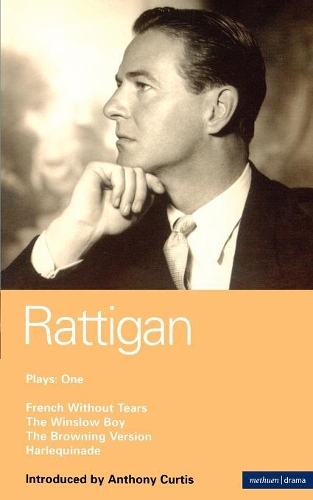
Rattigan Plays: 1: French Without Tears; The Winslow Boy; The Browning Version; Harlequinade
(Paperback)
Available Formats
Publishing Details
Rattigan Plays: 1: French Without Tears; The Winslow Boy; The Browning Version; Harlequinade
By (Author) Terence Rattigan
Bloomsbury Publishing PLC
Methuen Drama
1st August 2006
United Kingdom
Classifications
General
Non Fiction
822.912
Physical Properties
Paperback
288
Width 124mm, Height 202mm, Spine 20mm
326g
Description
"Few dramatists of this century have written with more understanding of the human heart than Terence Rattigan" (Guardian)
Constantly revived on stage, radio and television, Rattigan's plays demonstrate their continuing power to hold and move audiences. This volume contains his best work from the thirties and forties, including his first play French Without Tears, about a group of "bright young things" attempting to learn French on the Riviera amid numerous distractions. The second play The Winslow Boy, based on an actual case, is the powerful, deliberately well-made drama of a father's attempts to clear his cadet son's name against the assembled might of Britain's naval establishment - the Admiralty. Completing the volume are two one-act plays Harlequinade, a sustained joke against some well-worn theatrical conventions and The Browning Version which portrays a disliked classics master, Crocker-Harris on the point of retiring after eighteen years of unsuccessful teaching "well up there among the dozen greatest plays written in this country this century." (The Spectator)
"Terence Rattigan is the English Tennessee Williams. He maps out the same fatal divorce between the spiritual and the physical, the same drama of lost souls and misdirected lusts, of people stranded with their frustrations, blasted by guilt and reaching out for rescue that they know full well will fail" (Sunday Times)
Reviews
Winslow Boy:'Rattigan's defiant reiteration of the ancient legal mantra "let right be done", his attack on "the despotism of bureaucracy", his declaration that democracy will be the poorer if smaller injustices are ignored, his faith that the English will triumph over tyranny - all that packs a punch today, as it did when the play had its premiere in 1946.' Benedict Nightingale, The Times, 19.5.09 Winslow Boy: 'A paragon of well-made drama What a fine piece of craftsmanship this play is. The overall plot is a cunningly laid series of twists and snares.' Patrick Marmion, Daily Mail, 22.5.09 'One of the finest dramatists of the last century, uniting superb technical skills with a deep understanding of both the human heart and the British habit of repressing emotion.' Charles Spencer, Daily Telegraph, 22.5.09
Author Bio
Sir Terence Rattigan (1911-77) was a British playwright, whose well-structured plays enjoyed enormous success in the years before and after World War II. At one time three of his works were running simultaneously in the West End. Rattigan was knighted in 1971, the first dramatist to be so honoured since the war. When Rattigan was a young man his father, a wealthy diplomat, agreed to finance his writing for a maximum of two years. After 23 months, Rattigan produced his first comedy, French Without Tears (1936), about a group of young Englishmen learning French in a crammer. It ran for 1049 performances at the Criterion Theatre, providing Rattigan with perhaps the greatest success ever enjoyed by a West End newcomer. His second success, After the Dance, dealt with the danger of stifled passion; it was revived by the BBC in 1993. His great wartime successes included a drama inspired by his days in the RAF, Flare Path (1942), and While The Sun Shines (1943), which ran for 1154 performances. The Winslow Boy (1946), which won many awards, told the true story of a father's campaign to prove his son innocent of an act of petty theft. Later outstanding works included The Browning Version (1948), The Deep Blue Sea (1952), a moving story about adultery and suicide (written after the suicide of his lover Kenneth Morgan), Separate Tables (1955), and Ross (1960) in which Sir Alec Guinness starred as T. E. Lawrence. Rattigan lived an extravagant life, driving a Rolls-Royce with a personalized number plate and gambling away the 25,000 he made from French Without Tears in three weeks. His lifestyle and attitudes were diametrically opposed to those of the Angry Young Men of the mid 1950s, who tended to regard his work as the epitome of everything they disliked in contemporary drama. Rattigan stated publicly that he hated Osborne's Look Back in Anger (1956) and as the new kitchen sink realism became popular his reputation waned, along with that of Nol Coward and others of his generation. "We were told we were oldfashioned, effete, and corrupt," he said. More recently, however, there has been a resurgence of interest in Rattigan's work. This trend began with a revival of The Deep Blue Sea at the Almeida Theatre in 1993, the first major production since its premiere over 40 years earlier. Successful revivals of The Winslow Boy, Separate Tables, and other lesser known works have followed.
